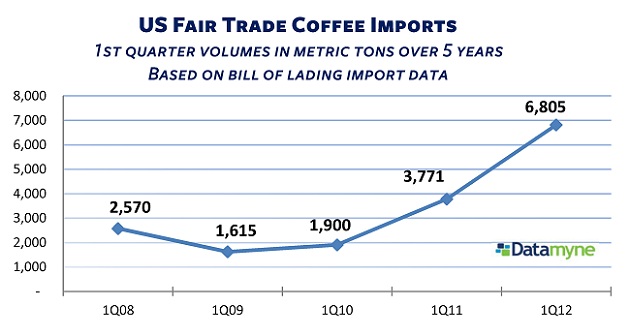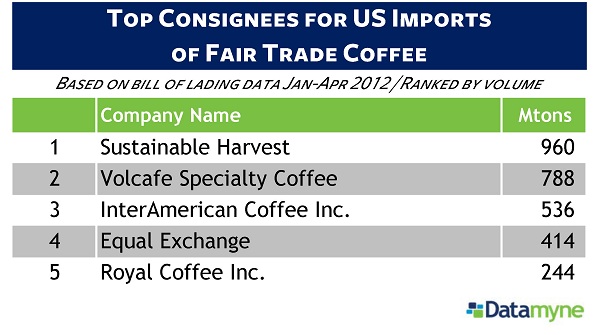Fair trade coffee gains ground among fine, specialty brews
As Bill Armbruster notes in Fair Trade: Sustainable Trend?, imported coffee accounted for 78% of all the fair trade premiums paid by US companies in 2011.
Fair Trade USA reports that 2011 was a banner year for certified fair trade coffee imports and for the community development premiums they generated: $17 million, up 61% from 2010.
Datamyne US import data, based on bills of lading documenting incoming shipments, indicates that 2012 is on its way to setting new records for fair trade coffee, with first-quarter volume up 55% compared to the same period in 2011.
A closer examination of the bill of lading data uncovers evidence that this growth trend may well be sustainable. Take a look at the top importers (consignees) of fair trade coffee.
Top-ranked Sustainable Harvest was founded in 1997 with the mission of transforming the coffee industry by importing certified beans. Sustainable Harvest is a certified B Corporation, meaning that its social and environmental values are incorporated in its bylaws. You can read the company’s 2011 impact report here.
Similarly, fourth-ranked Equal Exchange was created in 1986 to build “a food system that empowers farmers and consumers, supports small farmer co-ops, and uses sustainable farming methods.” Learn more about the company, which imports fair trade and organic tea, chocolate bars, cocoa, bananas, and almonds, as well as coffee, here.
In contrast, second-ranked Volcafe can trace its roots back to 1851, when brothers Salomon and Johann Georg Volkart began trading operations between Switzerland and India. Volcafe Specialty Coffee was formed in 2001 by Swiss parent ERB Group to promote specialty coffees in the US market.
InterAmerican Coffee, which imports and distributes fine specialty coffees, including Elan brand sustainable coffees, throughout the US and Canada, was established in 1983. It is one of 46 companies in 28 countries that make up the Hamburg-headquartered Neumann Kaffee Gruppe.
Royal Coffee opened its doors in 1978, at time when, as the company website says, “specialty coffee was an afterthought, existing far from the mainstream, in the realm of the few. Until that time, the best coffees were for the most part imported by the institutional roasters and blended in with the lower grades to make their canned products palatable.” Royal Coffee’s mission has been to develop an international family of independent farmers and exporters with the purpose of bringing fine specialty coffees to US consumers.
The presence of Volcafe, InterAmerican, and Royal among the top fair trade importers is, we think, a positive sign. It’s an indication that “fair trade” is earning recognition among consumers as a specialty brand. And it confirms that dealing in fair trade coffee promises to be good business.





